英语语法动名词讲解及练习
- 格式:doc
- 大小:28.03 KB
- 文档页数:8
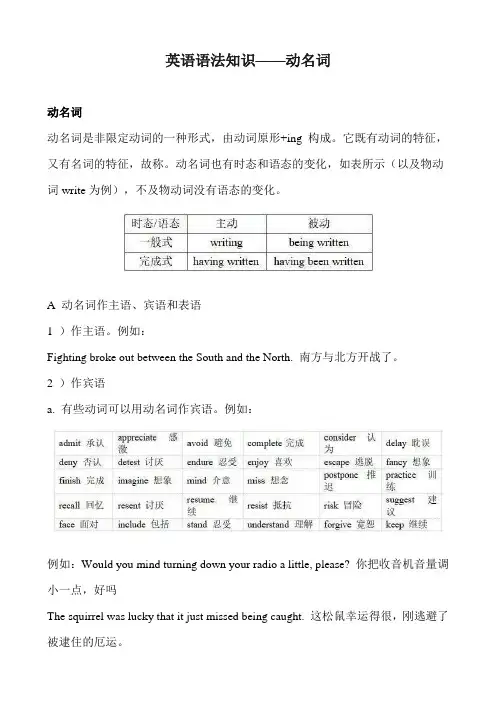
英语语法知识——动名词动名词动名词是非限定动词的一种形式,由动词原形+ing 构成。
它既有动词的特征,又有名词的特征,故称。
动名词也有时态和语态的变化,如表所示(以及物动词write为例),不及物动词没有语态的变化。
A 动名词作主语、宾语和表语1 )作主语。
例如:Fighting broke out between the South and the North. 南方与北方开战了。
2 )作宾语a. 有些动词可以用动名词作宾语。
例如:例如:Would you mind turning down your radio a little, please? 你把收音机音量调小一点,好吗The squirrel was lucky that it just missed being caught. 这松鼠幸运得很,刚逃避了被逮住的厄运。
b. 有些结构后面可以用动名词作宾语或其他成分。
例如:3 )作表语,对主语说明、解释。
例如:Her job is washing, cleaning and taking care of the children. 她的工作是洗刷、清扫和照顾孩子。
比较:She is washing, cleaning and taking care of the children.4 )作定语,一般表示所修饰名词事物的用途。
例如:a writing desk=a desk for writing 写字台a swimming pool=a pool swimming 游泳池有些动名词作定语,与所修饰的名词关系比较复杂。
例如:boiling point=a temperature point at which something begins to boil 沸点a walking tractor=a tractor which a driver can operate while he or she is walking behind it手扶拖拉机B worth 的用法worth, worthy, worthwhile 都是形容词,意为"值得"。
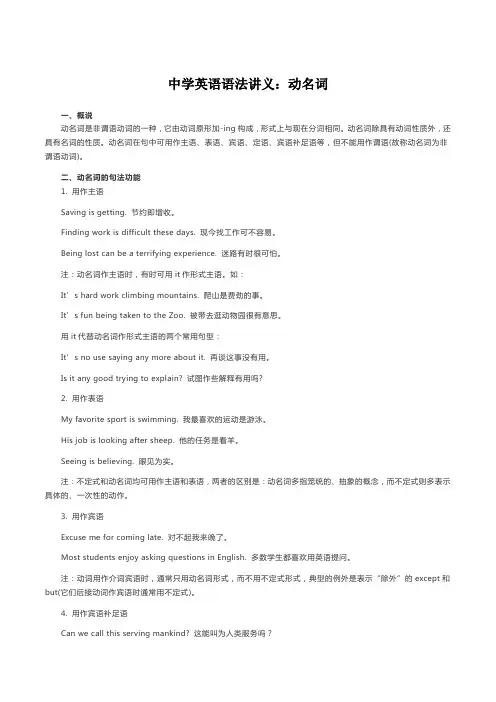
中学英语语法讲义:动名词一、概说动名词是非谓语动词的一种,它由动词原形加-ing构成,形式上与现在分词相同。
动名词除具有动词性质外,还具有名词的性质。
动名词在句中可用作主语、表语、宾语、定语、宾语补足语等,但不能用作谓语(故称动名词为非谓语动词)。
二、动名词的句法功能1. 用作主语Saving is getting. 节约即增收。
Finding work is difficult these days. 现今找工作可不容易。
Being lost can be a terrifying experience. 迷路有时很可怕。
注:动名词作主语时,有时可用it作形式主语。
如:It’s hard work climbing mountains. 爬山是费劲的事。
It’s fun being taken to the Zoo. 被带去逛动物园很有意思。
用it代替动名词作形式主语的两个常用句型:It’s no use saying any more about it. 再谈这事没有用。
Is it any good trying to explain? 试图作些解释有用吗?2. 用作表语My favorite sport is swimming. 我最喜欢的运动是游泳。
His job is looking after sheep. 他的任务是看羊。
Seeing is believing. 眼见为实。
注:不定式和动名词均可用作主语和表语,两者的区别是:动名词多指笼统的、抽象的概念,而不定式则多表示具体的、一次性的动作。
3. 用作宾语Excuse me for coming late. 对不起我来晚了。
Most students enjoy asking questions in English. 多数学生都喜欢用英语提问。
注:动词用作介词宾语时,通常只用动名词形式,而不用不定式形式,典型的例外是表示“除外”的except和but(它们后接动词作宾语时通常用不定式)。
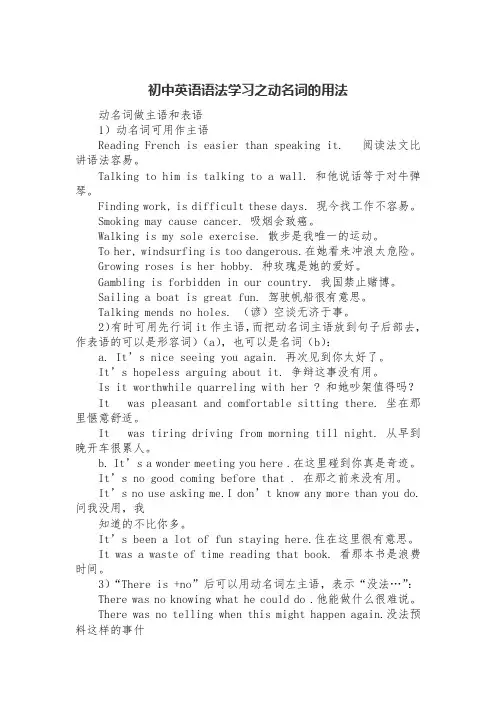
初中英语语法学习之动名词的用法动名词做主语和表语1)动名词可用作主语Reading French is easier than speaking it. 阅读法文比讲语法容易。
Talking to him is talking to a wall. 和他说话等于对牛弹琴。
Finding work, is difficult these days. 现今找工作不容易。
Smoking may cause cancer. 吸烟会致癌。
Walking is my sole exercise. 散步是我唯一的运动。
To her, windsurfing is too dangerous.在她看来冲浪太危险。
Growing roses is her hobby. 种玫瑰是她的爱好。
Gambling is forbidden in our country. 我国禁止赌博。
Sailing a boat is great fun. 驾驶帆船很有意思。
Talking mends no holes. (谚)空谈无济于事。
2)有时可用先行词it作主语,而把动名词主语放到句子后部去,作表语的可以是形容词)(a),也可以是名词(b):a. It’s nice seeing you again. 再次见到你太好了。
It’s hopeless arguing about it. 争辩这事没有用。
Is it worthwhile quarreling with her ? 和她吵架值得吗?It was pleasant and comfortable sitting there. 坐在那里惬意舒适。
It was tiring driving from morning till night. 从早到晚开车很累人。
b. It’s a wonder meeting you here .在这里碰到你真是奇迹。
It’s no good coming before that . 在那之前来没有用。
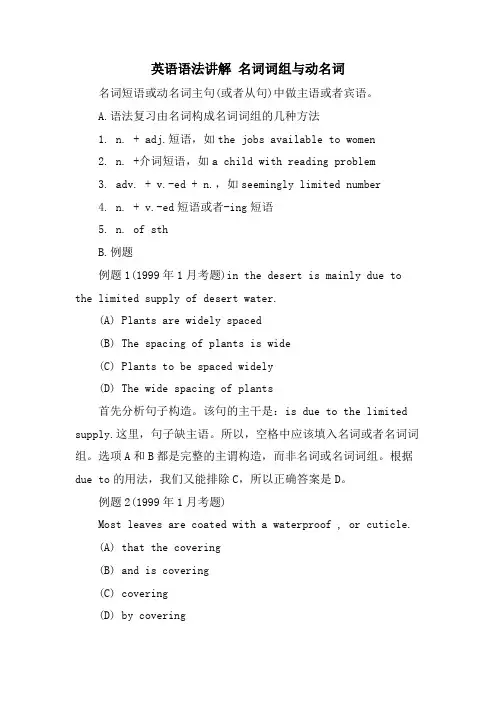
英语语法讲解名词词组与动名词名词短语或动名词主句(或者从句)中做主语或者宾语。
A.语法复习由名词构成名词词组的几种方法1. n. + adj.短语,如the jobs available to women2. n. +介词短语,如a child with reading problem3. adv. + v.-ed + n.,如seemingly limited number4. n. + v.-ed短语或者-ing短语5. n. of sthB.例题例题1(1999年1月考题)in the desert is mainly due to the limited supply of desert water.(A) Plants are widely spaced(B) The spacing of plants is wide(C) Plants to be spaced widely(D) The wide spacing of plants首先分析句子构造。
该句的主干是:is due to the limited supply.这里,句子缺主语。
所以,空格中应该填入名词或者名词词组。
选项A和B都是完整的主谓构造,而非名词或名词词组。
根据due to的用法,我们又能排除C,所以正确答案是D。
例题2(1999年1月考题)Most leaves are coated with a waterproof , or cuticle.(A) that the covering(B) and is covering(C) covering(D) by covering这已经是一个简单的句子构造,即主谓完整。
如果你认识waterproof这个词,你就知道空格里应该填入名词。
因为waterproof是形容词,它只能修饰名词或者动名词。
(这里的waterproof不能表示类别做名词,因为前面的冠词是a而不是the)你也可以根据平行构造,由or cuticle判断空格里应该填入名词或者动名词。
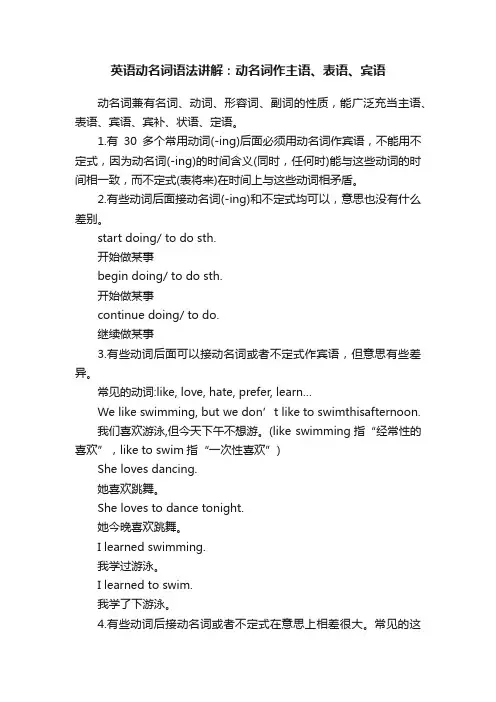
英语动名词语法讲解:动名词作主语、表语、宾语动名词兼有名词、动词、形容词、副词的性质,能广泛充当主语、表语、宾语、宾补、状语、定语。
1.有30多个常用动词(-ing)后面必须用动名词作宾语,不能用不定式,因为动名词(-ing)的时间含义(同时,任何时)能与这些动词的时间相一致,而不定式(表将来)在时间上与这些动词相矛盾。
2.有些动词后面接动名词(-ing)和不定式均可以,意思也没有什么差别。
start doing/ to do sth.开始做某事begin doing/ to do sth.开始做某事continue doing/ to do.继续做某事3.有些动词后面可以接动名词或者不定式作宾语,但意思有些差异。
常见的动词:like, love, hate, prefer, learn…We like swimming, but we don’t like to swimthisafternoon.我们喜欢游泳,但今天下午不想游。
(like swimming指“经常性的喜欢”,like to swim指“一次性喜欢”)She loves dancing.她喜欢跳舞。
She loves to dance tonight.她今晚喜欢跳舞。
I learned swimming.我学过游泳。
I learned to swim.我学了下游泳。
4.有些动词后接动名词或者不定式在意思上相差很大。
常见的这类动词有:remember, forget, regret…I remember posting the two parcels.我记得已寄走两个包裹。
(动名词表示过去)I remember to post the two parcels.我记得要寄两个包裹。
(不定式表示将来)He regrets offending three classmates.他后悔得罪了3个同学。
(已得罪)He regrets to offend three classmates.他很遗憾要得罪3个同学。
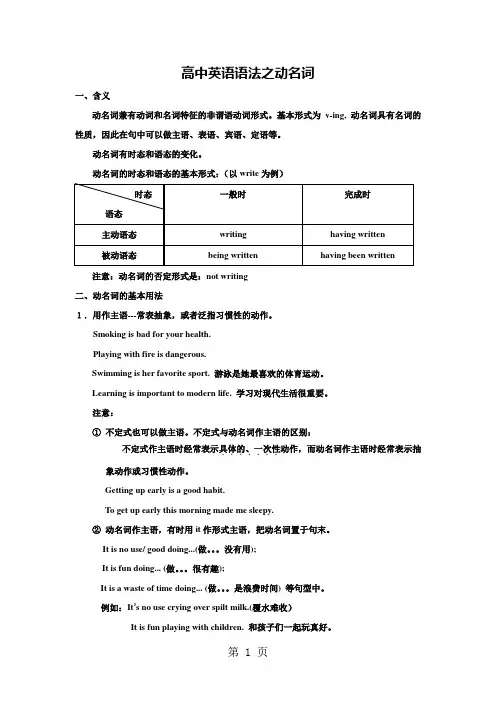
高中英语语法之动名词一、含义动名词兼有动词和名词特征的非谓语动词形式。
基本形式为v-ing, 动名词具有名词的性质,因此在句中可以做主语、表语、宾语、定语等。
动名词有时态和语态的变化。
动名词的时态和语态的基本形式:(以write为例)注意:动名词的否定形式是:not writing二、动名词的基本用法1.用作主语---常表抽象,或者泛指习惯性的动作。
Smoking is bad for your health.Playing with fire is dangerous.Swimming is her favorite sport. 游泳是她最喜欢的体育运动。
Learning is important to modern life. 学习对现代生活很重要。
注意:①不定式也可以做主语。
不定式与动名词作主语的区别:不定式作主语时经常表示具体的、一次性.......动作,而动名词作主语时经常表示抽象动作或习惯性动作。
Getting up early is a good habit.To get up early this morning made me sleepy.②动名词作主语,有时用it作形式主语,把动名词置于句末。
It is no use/ good doing...(做。
没有用);It is fun doing... (做。
很有趣);It is a waste of time doing... (做。
是浪费时间) 等句型中。
例如:It’s no use crying over spilt milk.(覆水难收)It is fun playing with children. 和孩子们一起玩真好。
It is a waste of time persuading such a person to join us.说服这样一个人加入我们当中来是浪费时间。
2. 作宾语①作某些及物动词的宾语常见的动词有:advise,avoid,delay,escape,excuse,enjoy,consider,finish,deny,fancy,keep,mind(在乎)postpone,pardon,practise,suggest,imagine等。
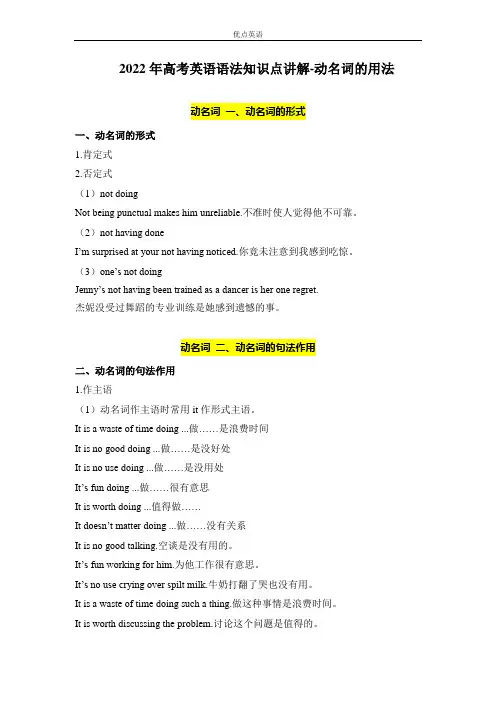
2022年高考英语语法知识点讲解-动名词的用法动名词一、动名词的形式一、动名词的形式1.肯定式2.否定式(1)not doingNot being punctual makes him unreliable.不准时使人觉得他不可靠。
(2)not having doneI’m surprised at your not having noticed.你竟未注意到我感到吃惊。
(3)one’s not doingJenny’s not having been trained as a dancer is her one regret.杰妮没受过舞蹈的专业训练是她感到遗憾的事。
动名词二、动名词的句法作用二、动名词的句法作用1.作主语(1)动名词作主语时常用it作形式主语。
It is a waste of time doing ...做……是浪费时间It is no good doing ...做……是没好处It is no use doing ...做……是没用处It’s fun doing ...做……很有意思It is worth doing ...值得做……It doesn’t matter doing ...做……没有关系It is no good talking.空谈是没有用的。
It’s fun working for him.为他工作很有意思。
It’s no use crying over spilt milk.牛奶打翻了哭也没有用。
It is a waste of time doing such a thing.做这种事情是浪费时间。
It is worth discussing the problem.讨论这个问题是值得的。
It doesn’t matter wasting a little money.浪费一点钱没有关系。
【比较】①It was nice meeting you.见到你真高兴!(用于分别时)②It is nice to meet you.(用于刚刚见面时)(2)“There is no doing sth.” 句式中作主语,意为“不可能……,无法……”There’s no denying the fact.这一事实不容否认。
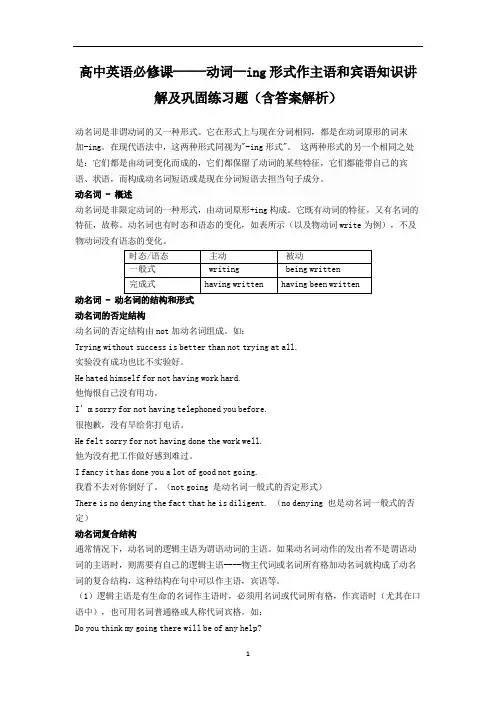
高中英语必修课-----动词--ing形式作主语和宾语知识讲解及巩固练习题(含答案解析)动名词是非谓动词的又一种形式。
它在形式上与现在分词相同,都是在动词原形的词末加-ing。
在现代语法中,这两种形式同视为"-ing形式"。
这两种形式的另一个相同之处是:它们都是由动词变化而成的,它们都保留了动词的某些特征,它们都能带自己的宾语、状语,而构成动名词短语或是现在分词短语去担当句子成分。
动名词-概述动名词是非限定动词的一种形式,由动词原形+ing构成。
它既有动词的特征,又有名词的特征,故称。
动名词也有时态和语态的变化,如表所示(以及物动词write为例),不及物动词没有语态的变化。
动名词-动名词的结构和形式动名词的否定结构动名词的否定结构由not加动名词组成。
如:Trying without success is better than not trying at all.实验没有成功也比不实验好。
He hated himself for not having work hard.他悔恨自己没有用功。
I’m sorry for not having telephoned you before.很抱歉,没有早给你打电话。
He felt sorry for not having done the work well.他为没有把工作做好感到难过。
I fancy it has done you a lot of good not going.我看不去对你倒好了。
(not going是动名词一般式的否定形式)There is no denying the fact that he is diligent.(no denying也是动名词一般式的否定)动名词复合结构通常情况下,动名词的逻辑主语为谓语动词的主语。
如果动名词动作的发出者不是谓语动词的主语时,则需要有自己的逻辑主语----物主代词或名词所有格加动名词就构成了动名词的复合结构,这种结构在句中可以作主语,宾语等。
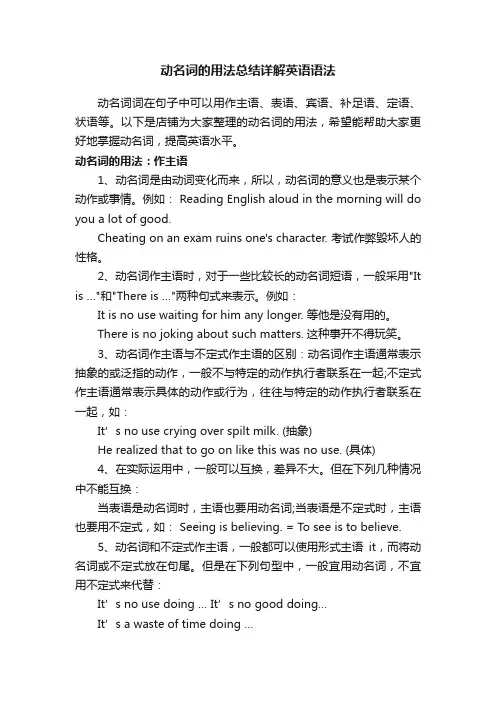
动名词的用法总结详解英语语法动名词词在句子中可以用作主语、表语、宾语、补足语、定语、状语等。
以下是店铺为大家整理的动名词的用法,希望能帮助大家更好地掌握动名词,提高英语水平。
动名词的用法:作主语1、动名词是由动词变化而来,所以,动名词的意义也是表示某个动作或事情。
例如: Reading English aloud in the morning will do you a lot of good.Cheating on an exam ruins one's character. 考试作弊毁坏人的性格。
2、动名词作主语时,对于一些比较长的动名词短语,一般采用"It is …"和"There is …"两种句式来表示。
例如:It is no use waiting for him any longer. 等他是没有用的。
There is no joking about such matters. 这种事开不得玩笑。
3、动名词作主语与不定式作主语的区别:动名词作主语通常表示抽象的或泛指的动作,一般不与特定的动作执行者联系在一起;不定式作主语通常表示具体的动作或行为,往往与特定的动作执行者联系在一起,如:It’s no use crying over spilt milk. (抽象)He realized that to go on like this was no use. (具体)4、在实际运用中,一般可以互换,差异不大。
但在下列几种情况中不能互换:当表语是动名词时,主语也要用动名词;当表语是不定式时,主语也要用不定式,如: Seeing is believing. = To see is to believe.5、动名词和不定式作主语,一般都可以使用形式主语it,而将动名词或不定式放在句尾。
但是在下列句型中,一般宜用动名词,不宜用不定式来代替:It’s no use doing … It’s no good doing…It’s a waste of time doing …动名词的用法:作表语1、动名词作表语与现在分词作表语的区别:动名词作表语时相当于名词,说明主语的含义及内容,它与主语是同等关系,主语与表语互换位置不影响句子的基本含义,但不可用副词来修饰。
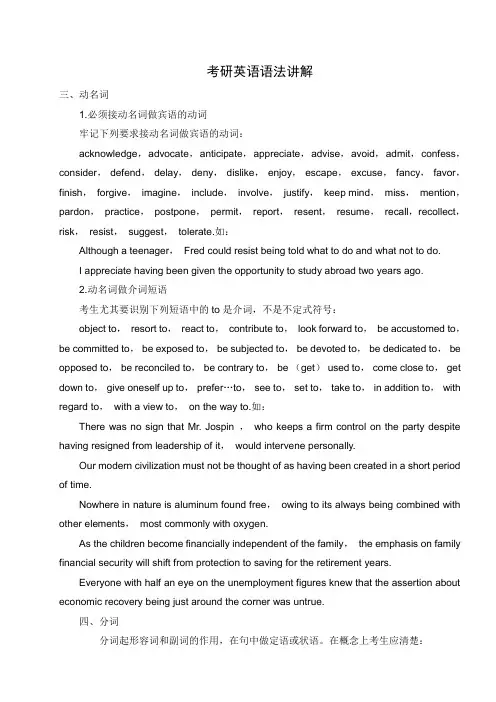
考研英语语法讲解三、动名词1.必须接动名词做宾语的动词牢记下列要求接动名词做宾语的动词:acknowledge,advocate,anticipate,appreciate,advise,avoid,admit,confess,consider,defend,delay,deny,dislike,enjoy,escape,excuse,fancy,favor,finish,forgive,imagine,include,involve,justify,keep mind,miss,mention,pardon,practice,postpone,permit,report,resent,resume,recall,recollect,risk,resist,suggest,tolerate.如:Although a teenager,Fred could resist being told what to do and what not to do.I appreciate having been given the opportunity to study abroad two years ago.2.动名词做介词短语考生尤其要识别下列短语中的to是介词,不是不定式符号:object to,resort to,react to,contribute to,look forward to,be accustomed to,be committed to,be exposed to,be subjected to,be devoted to,be dedicated to,be opposed to,be reconciled to,be contrary to,be (get)used to,come close to,get down to,give oneself up to,prefer…to,see to,set to,take to,in addition to,with regard to,with a view to,on the way to.如:There was no sign that Mr. Jospin ,who keeps a firm control on the party despite having resigned from leadership of it,would intervene personally.Our modern civilization must not be thought of as having been created in a short period of time.Nowhere in nature is aluminum found free,owing to its always being combined with other elements,most commonly with oxygen.As the children become financially independent of the family,the emphasis on family financial security will shift from protection to saving for the retirement years.Everyone with half an eye on the unemployment figures knew that the assertion about economic recovery being just around the corner was untrue.四、分词分词起形容词和副词的作用,在句中做定语或状语。
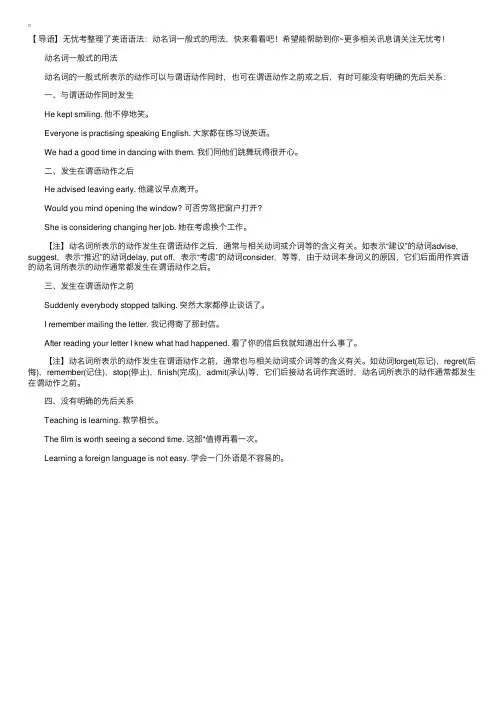
【导语】⽆忧考整理了英语语法:动名词⼀般式的⽤法,快来看看吧!希望能帮助到你~更多相关讯息请关注⽆忧考! 动名词⼀般式的⽤法 动名词的⼀般式所表⽰的动作可以与谓语动作同时,也可在谓语动作之前或之后,有时可能没有明确的先后关系: ⼀、与谓语动作同时发⽣ He kept smiling. 他不停地笑。
Everyone is practising speaking English. ⼤家都在练习说英语。
We had a good time in dancing with them. 我们同他们跳舞玩得很开⼼。
⼆、发⽣在谓语动作之后 He advised leaving early. 他建议早点离开。
Would you mind opening the window? 可否劳驾把窗户打开? She is considering changing her job. 她在考虑换个⼯作。
【注】动名词所表⽰的动作发⽣在谓语动作之后,通常与相关动词或介词等的含义有关。
如表⽰“建议”的动词advise, suggest,表⽰“推迟”的动词delay, put off,表⽰“考虑”的动词consider,等等,由于动词本⾝词义的原因,它们后⾯⽤作宾语的动名词所表⽰的动作通常都发⽣在谓语动作之后。
三、发⽣在谓语动作之前 Suddenly everybody stopped talking. 突然⼤家都停⽌谈话了。
I remember mailing the letter. 我记得寄了那封信。
After reading your letter I knew what had happened. 看了你的信后我就知道出什么事了。
【注】动名词所表⽰的动作发⽣在谓语动作之前,通常也与相关动词或介词等的含义有关。
如动词forget(忘记),regret(后悔),remember(记住),stop(停⽌),finish(完成),admit(承认)等,它们后接动名词作宾语时,动名词所表⽰的动作通常都发⽣在谓动作之前。
英语语法:动名词的详细分析讲解1. 动名词概说动名词既具有动词的性质,又具有名词的性质,因此叫动名词。
①动名词的动词性质表现在,它可以和宾语或状语组成动名词短语如:My job is arranging the agenda for my boss.我的工作是为老板安排日程。
I finished the project in a month by working overtime.我靠加班在一个月内做完了这个项目。
②动名词的名词性质表现在,它可以在句巾用作主语、宾语等如:Studying abroad can be a good experience.留学是一种很好的经历。
(作主语)I regret telling her the truth.我后悔告诉她事实真相了。
(作宾语)2. 动名词的形式和特征动名词由“动词原形do+ - ing”构成。
动名词有以下时态与语态的变化:①动名词的一般式1)一般式所表示的动作和谓语动词的动作同时发生,表示经常性、习惯性的动作(或状态),也可能在谓语动词表示的动作之后发生。
I enjoy skiing in nature.我享受在大自然中滑雪。
(enjoy与skiing同时发生)He insisted on going with us.他坚持跟我们一起去。
(going发生在insisted on之后)2)有的动名词所表示的动作发生在谓语动词表示的动作之前,如:We don't remember reading the article before.我们不记得以前看过这篇文章了。
(reading发生在remember之前)They will never forget running into the super model in the mall.他们永远不会忘记在商场里偶遇那位超模。
(running into发生在forget之前)②动名词的完成式动名词的完成式表示的动作发生在谓语动词表示的动作之前。
高中英语动名词练习题30题含答案解析1.She is good at playing basketball and swimming. What about you?- playing football- play tennis- to play badminton答案解析:playing football。
本题考查动名词作宾语。
be good at 后面接动名词形式,play football 是动名词短语,符合语法规则;play tennis 是动词原形,不符合;to play badminton 是动词不定式,也不符合。
2.After finishing his homework, he went out for a walk.- finish his test- to finish his essay- finishing his report答案解析:finishing his report。
本题考查动名词作宾语。
after 是介词,后面接动名词形式,finishing his report 是动名词短语,符合语法规则;finish his test 是动词原形,不符合;to finish his essay 是动词不定式,也不符合。
3.Reading books is one of his hobbies. What's yours?- read magazines- to read newspapers- reading novels答案解析:reading novels。
本题考查动名词作主语。
动名词短语reading books 作主语,后面选项也应该是动名词形式,reading novels 符合语法规则;read magazines 是动词原形,不符合;to read newspapers 是动词不定式,也不符合。
4.He enjoys listening to music and watching movies. Do you?- listen to the radio- to watch TV shows- listening to podcasts答案解析:listening to podcasts。
英语语法动名词讲解及练习. 第二讲 动名词+听力练习 一.目标展示。仔细观察下列句子,注意划线部分的用法。 1. Mr. Li enjoys collecting things. 2. She practises playing the piano every morning. 3. Li Ming finished doing his homework at 9 p.m. 4. He admitted stealing his own vase. 5. They suggested going to the cinema. 二.结构
动词原形+ing(既具有动词性质又具有名词性质,可作主语但不能作谓语) e.g. Smoking may cause cancer. 三.用法 1. 作主语 e.g. Seeing is believing. 2. 作宾语 e.g. Did he admit breaking the vase? 3. 作表语 e.g. My job is teaching. 4. 作定语 e.g. a teaching building ▲四.常见接动名词作宾语的动词 enjoy 喜爱 finish 完成 keep 保持
mind 介意 practice 练习 consider 考虑 suggest 建议 admit 承认 deny 否认 feel like 想要 be busy 忙于 have fun玩的开心 be worth 值得 look forward to 期待 what/how about怎么样 eg. He felt like going to the park with me. It is worth reading the book. 五.接不定式和动名词均可,且含义相同的动词
like/love/hate/prefer/begin/start… eg. He likes to sing/singing. ▲★六.接不定式和动名词均可,但含义不同
1. remember/forget/regret to do sth. 记得/忘记/后悔去做某事(事情还未发生) 后悔做过某事(动作已经发生)/记得/忘记remember/forget/regret doing sth. eg. Remember to return my book to me tomorrow. I am sorry, but I remembered returning you the book yesterday.
2. try to do sth. 设法做某事(努力做某事) try doing sth. 尝试
着做某事 eg. I'll try to finish it today.ing at the back door. Let's try knock 3. stop doing sth. 停止做某事 停下来去做另一件事stop to do sth. eg. Stop making so much noise. 2
I was tired, let's stop to have a rest. 4.can't help doing sth. 禁不住去做某事
can't help to do sth. 不能帮助去做某事 eg. He can't help crying when he heard the bad news. The medicine can't help to get rid of your cold.
5.go on doing sth. 继续做同一件事情
go on to do sth. 继续做另外一件事情 eg. I went on working all the night. He went on doing his homework after finish eating supper. ★七.动名词用主动形式表被动含义
need/want/require 三个表示“需要”的动词后既可接 to do,也可接
doing, 含义相同, 接 doing时是用主动式表被动含义。 eg. The room needs cleaning. =The room needs to be cleaned. 课堂练习 一、用所给动词的适当形式填空。 1. I like __________ (read) English in the morning. 2. It's time for us to learn Lesson 3. Please stop ___________ (talk). 3. She was ill so she didn't feel like ___________ (eat) anything. 4. Do you mind ____________ (open) the window? 5. She enjoys ____________ (listen) to music. 6. He is looking forward to ___________ (visit) China. 7. Excuse me for _________ (come) late. 8. My favourite hobby is _____________ (play) chess. 9. Remember not ____________ (be) late again. 10. You should practice ____________ (write). 11. I can finish ____________ (read) the novel in an hour. 12. The doctor suggests ___________ (eat) less fast food. 13. You have promised ___________ (help) me. 14. She just happened ___________ (meet) you. 15. Don't stop, keep ___________ (move). 二、单项选择。 ( ) 1.Who taught you a car? A. driving B. to drive C. riding D. to ride ( ) 2. Today we use machines us do most of our work. A. to help B. help C. helping D. helped ( ) 3. I will never forget you for the first time. A. to meet B. meet C. meeting D. meets 3
( ) 4. I didn't spend all the money ______ the books. A. to buy B. have bought C. buying D. bought ( ) 5. Don't be afraid of mistakes when you learn English. A. make B. making C. to make D. made ( ) 6. The doctor was busy on the boy at that time. A. operate B. operating C. to operating D. operated ( )7. Return the book to the library as soon as you finish it. A. to read B. reading C. read D. have read ( ) 8. ----Would you mind my pet dog when I am out? ---- Sorry, I can't. I have to study for my test this week. A. take care of B. taking care of C. to take care of D. taking care ( ) 9. He kept there without to anybody. A. sitting; talk B. to sit; to talk C. sitting; talking D. sit; talking ( ) 10. It is no use theory without practice. A. to learn B. learning C. learn D. learned 三、翻译下列句子。
1.为什么不向老师求助呢?__________________________________________________ 2.我看到他们正在那边打棒球. __________________________________________________ 3. 我妈妈正忙于做家务。 __________________________________________________ 4. 我期待去参观长城。__________________________________________________ 5. 你介意打开窗户吗?__________________________________________________ 四、完成句子。
1. 我们累了,让我们停下来休息一下。 We are tired. Let's ______________________________. 2. 请记得为我买一本书。 Please ___________________________ a book for me. 3. 孩子们忙于做作业。 The children are busy _____________________ homework. 4. 你介意我抽烟吗? Do you mind me _____________ here? 5. 说起来容易坐起来难。 Talking is easier than _______________. 五、语法填空 You may have trouble (1) ________ (learn) a language. Here are a few (2) ________ (idea) to help you learn a language well. Learning the pronunciation of a language is (3)__________ important part of your language learning. You can learn this (4) _________ listening to the language as much as possible over the radio or on TV. Building up your vocabulary in a foreign language can take many (5) ________ (year). 4